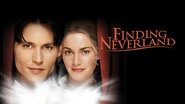Hisham Ziad El Sherbini
Loved the music and now I have the soundtrack and listen to it all the time since I watched the movie a few years ago. Depp and Winslet were amazing. Loved the children who made a beautiful impact on the movie and story. Such a magical movie even though its inspired by/based on a true story. Must see! On my all time favourites!
ElMaruecan82
Children are so impressionable their general perception of grown-ups is of very serious, capable and knowledgeable persons. Still, kids rarely envy adults to the point of wishing to trade places and stop playing games that exalt and satisfy their imagination. It works differently with adults, they have freedom, power and responsibilities but now and then, they give enough rope to the inner child so they can have a little fun and play.Indeed, before being the movie about James Barrie, author of "Peter Pan", who inspired the infamous syndrome of the same name, the film is about playing. It opens with a play that flopped with the audience, much to the stoic desperation of the theater's manager, played by Dustin Hoffman. Barrie is wondering how come a popular and fun art such as theater turned into a pompous and boring depository of aristocratic distractions. The manager, who's not your usual bloodsucker executive but a rather understanding person, simply reminds Barrie of the name of their creations: plays. This is a film that often says a lot with a brilliant economy of words.And as an immediate illustration, the next scene shows Barrie playing Indians with the four sons of Mrs. Sylvia Llewellyn Davies, half a Du Maurier and a widow, played with poignant vulnerability by Kate Winslet. She didn't find in Barrie a substitute for her deceased husband but a playmate for her boys. And Barrie's fertile imagination enables him to find each day a new game, a new source of inspiration. So you have a man whose business is to make plays: to pretend, to create new realities, and doing the same thing during his spare-time. You never can tell when Barrie is working or when he's having fun, in fact, he can't tell either. The only certitude is that his last play lost money and he must come up with something really good, time has come to make his masterpiece.We know where this is all leading to and all through that growing relationship between James and Sylvia, and the children, we have glimpses of Peter Pan's world slowly emerging, and the stronger the bonds get, the more it fuels James' imagination. But the play isn't the end in Marc Forster's movie; the focal point is the relationships, between Barrie and the kids and especially Peter, played by Freddie Highmore. After his father's death, Peter has grown up too fast and still blames his mother for having 'sugarcoated' the news. Peter embodies the precocious maturity of children who have to deal with a loved one's death and in his attempt to resurrect his faith in childhood fantasy; Barrie must also help him to deal with the worlds' sad realities, such as his mother's current illness.This challenge is at the core of the creative juice that made Peter Pan such a masterpiece of poetry, that and the instinct of Barrie who rightfully ordered to keep places for orphans at the opening night so that their laughter could convince the adults to watch the play with their childhood eyes. Some adults though seem immune to that capability: two subplots involve the tense relationship with Mrs. Du Maurier, Sylvia's no-nonsense mother (Julie Christie) and Mrs. Barrie (Rhada Mitchell). Both women can't indulge a man playing with children, as a full-time occupation. How can you ever teach them that there's a time to be serious and a time for fun when an adult doesn't set the example?But that might be the essence of the Peter Pan's syndrome: you don't accept a time for being serious. Peter does and this is why at the premiere, he says he's not Peter Pan, Barrie is. In fact, Barrie is as much an adult as all the others and the making of Peter Pan was a project he took very seriously, he was just lucky enough to have a job where fun plays a major part. "Finding Neverland" might say something about acting in general, an adult way to do kid's stuff or like recent Oscar-winner Viola Davis said, the art that celebrates what life is about. "Finding Neverland" like Forster's "Stranger than Fiction", is a self-reflexive gem that celebrates the inner poetry of life.And Johnny Depp's performance is pivotal because he doesn't fall in the trap of caricature; he doesn't pull an 'Ed Wood' or worse, a 'Willy Wonka' in his acting. Had Depp overplayed the eccentricity of Barrie, he would have looked like a big child, a weirdo whose fantasy creation could have as well been the product of some drugs' consumption. But by being an adult who only acts like a clown for 'adult' reasons, his Barrie turns into a fascinating character, both a subject and an object of existential studies. He tries to drain from kids' imagination some universal ideas about the world while translating it into his language and making the story understandable by adults.He becomes his own audience and his own voice, and in the process, Freddie Highmore -whose Peter is far more fascinating than his Charlie Becket- reconciles with his childhood while still understanding the adult world, he found 'Nerverland'. And while "Finding Neverland" could have ended in that triumphant note, it actually has a deeper respect for life and finds a note that is unexpectedly sad and poignant. Had the adult aligned with the child's mind, we'd have an ordinary coming-of-age conclusion, now, the opposite is more interesting.Indeed, the ending shows the edge adults have on children: adulthood is a mystery for kids, but adults know what childhood is about, it is their role to help them reach that important phase of life, and that's what Barrie is determined to accomplish. Meanwhile he can also ask the grown-ups to slow down the growing process and have fun now and then. Who said Peter Pan's syndrome had to be permanent? Shouldn't we all find our Neverland sometime, somewhere?
Adams5905
How did this sneak under my radar?.. A wonderful film-ideally suited for a wet Sunday afternoon-warm and tender, but bitter-sweet, melancholic, and even bleak in places... A marvellous tour-de-force performance from Johnny Depp (he's never been better)-some might say he is a little young (the author/playwright was 44 years old when his play was first staged), but Barrie was an innocent, and always young-at-heart... Perhaps his trademark soup-strainer might have given Depp more gravitas... And with a wonderfully understated yet convincing Scottish accent as well (Hollywood, take note), Depp once again proves himself to be simply the best young leading man Hollywood has to offer-in fact, we're also treated to what I believe to be a prototype Jack Sparrow, as, although this was released after 'Pirates of the Caribbean', it was filmed before... He is ably supported by Kate Winslet, although I do think she could have worked harder on her diction, and a simply delicious turn from the delectable Julie Christie as the ogre-in-waiting, and the implied inspiration for the future Captain Hook.Much like when reading the book that Barrie wrote after his play's success, 'Wendy and Peter' (and even it's woeful sequel, 'Peter Pan in Scarlet'), this is a work best enjoyed by suspending one's disbelief. The film is punctuated by imaginary vignettes, which would eventually coalesce into the play 'Peter Pan, or, The Boy Who Would Not Grow Up'. It's a fascinating re-thinking of exactly how Barrie's Chef d'Oeuvre came to be, albeit with some tactical artistic interpretation of dates and facts (there were no 25 orphans attending the premiere, but it still raised a lump to my throat). The four brothers (Freddie Highmore, Joe Prospero, Nick Roud and Luke Spill) all excel-their delivery can be stilted at times, but Highmore, particularly, is a revelation. Dustin Hoffman, effectively in a cameo role as Barrie's American backer, Charles Frohman, breezes through his performance in true veteran style, never breaking sweat, but I felt the ensemble cast was rather let down by Radha Mitchell, playing Mary Ansell, Barrie's wife-no engagement there at all... The supporting cast is sprinkled with familiar faces, all clearly enjoying themselves, the set-dressing, costumes and attention to detail all superb ...So, altogether a magical film about a magical summer leading to the creation of a magical play (and book), which is still delighting audiences to this day. I was gladdened to read "with enormous gratitude to GREAT ORMOND STREET HOSPITAL FOR CHILDREN" (who, of course, still own the rights), in the credits, and hope they benefited hugely from this film.Settle down with your children and grandchildren, a soothing drink, and a fire in the grate-for children from five to 95... Enjoy!..
John Brooks
In short, this is a smooth viewing, but it clearly falls short in what it's supposed to supply. The good points are the entertaining watch this provides, Johnny Depp, an excellent child actor's performance (Peter), the ever so beautiful Radha Mitchell (hah...), and all in all the good story being told here.The problem is the great potential such a story/casting/philosophical point holds and is absolutely necessary to be fulfilled. And this clearly, clearly falls short of it. We're given a taste of what it could've been like, we're given glimpses of what could've been achieved here; but only sketches, elusive hints...never the real thing. This could've been a magical motion picture that dives the viewer into Neverland, and all the premises full of wonderful emotion and artistic/human sensitivity that come with it. In stead, this is a fairly flat realization of its plot, with interesting potential, never reached. Clearly not greatness, but also as clear was the potential for greatness.




